Habari? Nizuri sana sana.
I been trying to learn Swahili in my spare time and can practice on all the family which is great. It does not seem to be too tricky but like with all things needs a bit of time and effort to make any progress. The verb conjugations seem relatively straight forward so it just a matter of practice (I hope!).
Over the weekend I visited the Kitale museum which had indigenous mock huts representing some of the local tribes, a bio fuel demonstration plant, and a good collection of tribal artefacts and stuffed animals. I also went to the Kitale nature reserve outside town which housed a number of malformed animals which had been abandoned by their owners - there is a cow with 3 eyes and 4 horns which is a bit disturbing.
Sustainable Mobilisation of Agricultural Resource Technologies (SMART). The initiative is committed to discover, live and communicate what is needed to ensure long term sustainability of the West Pokot district's communities and global living system through appropriate agricultural resource technologies utilisation.
Tuesday, 31 August 2010
New Constitution
Today was a public holiday as President signed the new constitution which is seen as a rebirth after independence in 1963. It’s been a long time coming but all Kenyans are hopeful that this will signal a new start. We all huddled in the sitting room and watched the TV all morning, drinking ugi (ground millet with yoghurt and lemon juice) and seeing the events unfold in Uhuru park.
Friday, 27 August 2010
Visit to the Field
I have just spent the last two days visiting SMART’s operations out on the field. It has been a most interesting and rewarding experience meeting a number of farmer groups in the Central and West Pokot regions who have adopted SMART’s sustainable agricultural techniques.The farmers have been so welcoming and very positive about what SMART has been helping them with.
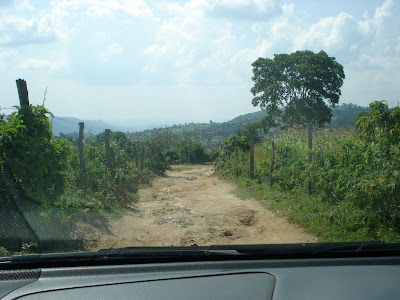
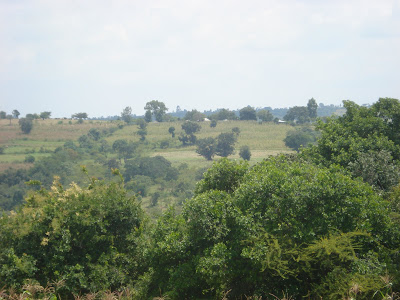

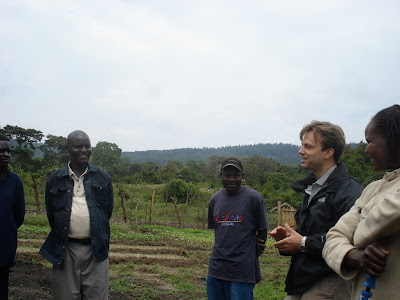


The initial encounters I have had when going to some groups have been very special. They have greeted us with singing and dancing which we all join in with - a great ice breaker if there ever was one.

Our meetings usually opened up with a prayer before we all made our introductions and explained why we were there. The group leaders would then make a short presentation before the floor was open to any questions from myself. Once I had been shown their plots we then closed with a prayer before being given a vibrant send off with more dancing and singing.



You can see that the farmers are very happy with what SMART have done and are very positive about the future. The farmer’s work very much as a team benefitting not only from the suatainable approach but also from the high nutritional content of the crops they produce (apparently people have a greater life expectancy from eating these local foods) as well as the positive environmental impact using sustainable techniques - this negates the need to use fertilsers and pesticides.

They also help train other farmers in the nearby area spreading SMART’s initiative. It seems that it is catching on as more and more people want to be part of SMART’s programme. However, SMART is restricted by its available funding so can not help as many people as it would like.


The sustainable farming introduced covers a number of techniques including crop rotation as well as using indigenous crops that are more suited to the local environment. They also use natural techniques to keep the soil fertile and pests at bay. For the latter they use indigenous flowers which they mix with chillies and soak in water overnight. They then spray this on their crops and it seems to be a very effective technique. Rotating their crops also reduces the risk of pests settling. They also use old tape from cassettes which are tied between two sticks to scare away the birds. However, they still have issues with other animals such as porcupines and need more funding so they can buy wire meshing to enclose their plots.


One of my first visits was to the Cheptikit woman’s group who wore fabulously bright clothes and greeted me with welcoming song, clapping and dancing. They presented me with a mango tree to plant which was a great honour before we carried on singing and dancing to and around their plot.


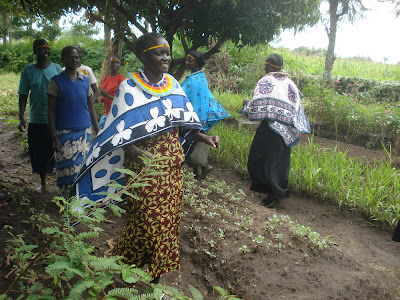
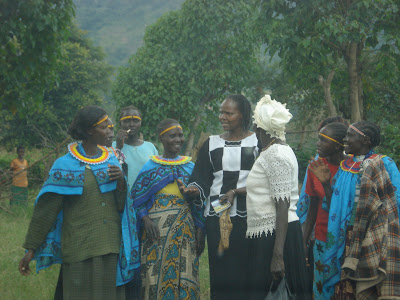

One of my final visits was to the Stayan group, west of Makutano. I was given a very lively welcome by a group of women who were singing and dancing as I arrived. We joined in while we were led up a grassy track only to be met half way by three men with spears and shields snaking their way towards us. As we met they gave me a spear and we continued dancing and singing to an opening gathering where they formally met their guests. Our dancing evolved into jumping on the spot – the men facing the women as the sound got louder and dancing more animated. It was a wonderful welcome although I had to catch my breath before we sat down for some chai. They gave me the name Stayan before I left so I felt very much part of the group!
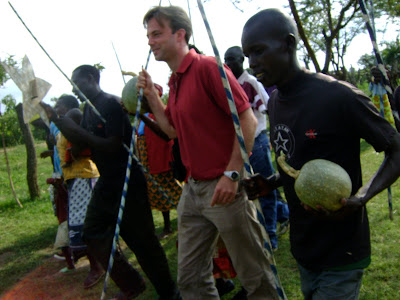

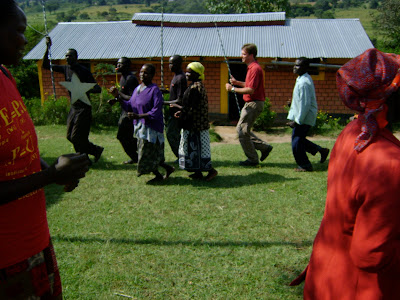





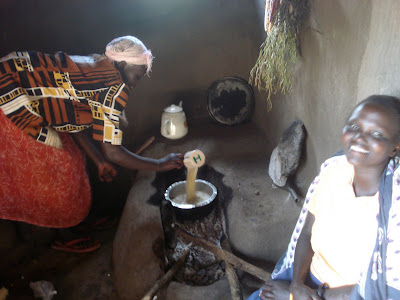

I must have seen over 10 farming groups in the last two days. They have been quite intensive days but it has really given me a good understanding what SMART does and how I can use this in helping them build their financial capacity. They have a real focus and the benefits can be seen through the people I have met. Sustainable agriculture has contributed to better health and a cleaner environment. It is only through the hard work and vision of those working at SMART that they have managed to achieve this. However,there is still a long way to go.






The initial encounters I have had when going to some groups have been very special. They have greeted us with singing and dancing which we all join in with - a great ice breaker if there ever was one.

Our meetings usually opened up with a prayer before we all made our introductions and explained why we were there. The group leaders would then make a short presentation before the floor was open to any questions from myself. Once I had been shown their plots we then closed with a prayer before being given a vibrant send off with more dancing and singing.



You can see that the farmers are very happy with what SMART have done and are very positive about the future. The farmer’s work very much as a team benefitting not only from the suatainable approach but also from the high nutritional content of the crops they produce (apparently people have a greater life expectancy from eating these local foods) as well as the positive environmental impact using sustainable techniques - this negates the need to use fertilsers and pesticides.

They also help train other farmers in the nearby area spreading SMART’s initiative. It seems that it is catching on as more and more people want to be part of SMART’s programme. However, SMART is restricted by its available funding so can not help as many people as it would like.


The sustainable farming introduced covers a number of techniques including crop rotation as well as using indigenous crops that are more suited to the local environment. They also use natural techniques to keep the soil fertile and pests at bay. For the latter they use indigenous flowers which they mix with chillies and soak in water overnight. They then spray this on their crops and it seems to be a very effective technique. Rotating their crops also reduces the risk of pests settling. They also use old tape from cassettes which are tied between two sticks to scare away the birds. However, they still have issues with other animals such as porcupines and need more funding so they can buy wire meshing to enclose their plots.


One of my first visits was to the Cheptikit woman’s group who wore fabulously bright clothes and greeted me with welcoming song, clapping and dancing. They presented me with a mango tree to plant which was a great honour before we carried on singing and dancing to and around their plot.





One of my final visits was to the Stayan group, west of Makutano. I was given a very lively welcome by a group of women who were singing and dancing as I arrived. We joined in while we were led up a grassy track only to be met half way by three men with spears and shields snaking their way towards us. As we met they gave me a spear and we continued dancing and singing to an opening gathering where they formally met their guests. Our dancing evolved into jumping on the spot – the men facing the women as the sound got louder and dancing more animated. It was a wonderful welcome although I had to catch my breath before we sat down for some chai. They gave me the name Stayan before I left so I felt very much part of the group!










I must have seen over 10 farming groups in the last two days. They have been quite intensive days but it has really given me a good understanding what SMART does and how I can use this in helping them build their financial capacity. They have a real focus and the benefits can be seen through the people I have met. Sustainable agriculture has contributed to better health and a cleaner environment. It is only through the hard work and vision of those working at SMART that they have managed to achieve this. However,there is still a long way to go.
Tuesday, 24 August 2010
Arrived in Kitale
After a 2am start on Saturday morning I finally arrived in Nairobi. My luggage was already waiting for me so no dramas on that front. However, the taxi drive to my hotel was an interesting experience. There is no roundabout etiquette, driving through red lights seems to be quite normal, and undertaking was also the standard. I had my seatbelt firmly on as we ventured further into the city centre past mutatus (minibuses) pounding out their afro beats. My hotel looked slightly suspect from the outside but once upstairs the place seemed to take on a character of its own with friendly staff and a lively bar. Saturday night was getting going.
The next morning I arrived at the Akamba bus station in good time to get my ticket for the bus ride up to Kitale only to find that the 8.30 service was no longer working. I had to grab a nearby taxi and haul my luggage to another coach station and just managed to get a seat before the bus left. I had unwisely booked the front row seat next to the driver so was in full view of his overtaking moves on hills and around blind corners. Beyond Eldoret the road was full of potholes so the going was pretty tough.

After 8 hours on the road I finally arrived in Kitale and met up with Jack, the SMART programme director. He took me to his house on the outskirts of the town where I met up with his wife Evelyn and their 6 sons. The location was fairly remote and quite a contrast to the fast pace of London life.
The food is an interesting mix of ugali (ground maize), chapatis, roast potatoes, chicken stew, goat, boiled bananas, green pulses, and ugi (ground millet mixed with yoghurt witha touch of lemon juice). This tends to get washed down with a cup of really sweet milky tea or chai - not good for the teeth but easy to get used to.
On Monday I had a meeting with the programme director, field officer and accountant to agree my objectives for the next 3 weeks. It was a useful start to my assignment so we all knew what needed to be done. For the first couple of days I have been getting to grips with how the organisation runs and how all things finance work. I am going to visit one of their field stations tomorrow to get a better understanding what training they provide to the local farmers.
The next morning I arrived at the Akamba bus station in good time to get my ticket for the bus ride up to Kitale only to find that the 8.30 service was no longer working. I had to grab a nearby taxi and haul my luggage to another coach station and just managed to get a seat before the bus left. I had unwisely booked the front row seat next to the driver so was in full view of his overtaking moves on hills and around blind corners. Beyond Eldoret the road was full of potholes so the going was pretty tough.

After 8 hours on the road I finally arrived in Kitale and met up with Jack, the SMART programme director. He took me to his house on the outskirts of the town where I met up with his wife Evelyn and their 6 sons. The location was fairly remote and quite a contrast to the fast pace of London life.
The food is an interesting mix of ugali (ground maize), chapatis, roast potatoes, chicken stew, goat, boiled bananas, green pulses, and ugi (ground millet mixed with yoghurt witha touch of lemon juice). This tends to get washed down with a cup of really sweet milky tea or chai - not good for the teeth but easy to get used to.
On Monday I had a meeting with the programme director, field officer and accountant to agree my objectives for the next 3 weeks. It was a useful start to my assignment so we all knew what needed to be done. For the first couple of days I have been getting to grips with how the organisation runs and how all things finance work. I am going to visit one of their field stations tomorrow to get a better understanding what training they provide to the local farmers.
Friday, 20 August 2010
Pre Departure Thoughts
Here goes - for those of you wondering why I am off to Kenya during the rainy season its certainly not a matter of catching a few sun rays. About a year ago I came across an organisation called Accounting for International Development (AFID) who were offering to place accountants like myself with NGOs across Africa and Asia. The great thing about AFID is that you can do it from 2 weeks upwards which is attractive for those who want help out but have other commitments that restrict them from going for longer (for more info go to www.afid.org.uk) . That was the easy bit. The difficult part was which NGO to be placed with. There was a wide range of organisations operating in enterprise, education and healthcare and in over 16 different countries. I chose enterprise - I liked the idea of working with an organisation that would eventually be able to generate some of its own income.
I finally decided on a placement with SMART, an agricultural NGO based in West Pokot, Western Kenya. West Pokot is traditionally a pastoralists' area - over the years over grazing has made parts of the district unable to sustain agricultural practices. With the increase in population and poor farming techniques the semi-arid zones are slowly turning arid. The SMART initiative is committed to the long-term sustainability of the area through using appropriate agricultural resource technologies.
You may be asking what my input is. With my experience as a chartered accountant I thought I could provide some valuable input by helping SMART improve its financial capacity (in short financial systems and management) to support its objectives. This is also key for any NGO and vital if it wishes to attract future funding - donors are more likely to provide funding if they know its being spent by a well run organisation.
I have a very early start tomorrow but am looking forward to the trip. My only concerns at the moment are waking up on time to get to the airport and hoping my luggage turns up at Nairobi - a previous volunteer was not so fortunate and had to wait a few days before his luggage (some of which had been pilfered) turned up. Fingers crossed.
Subscribe to:
Comments (Atom)